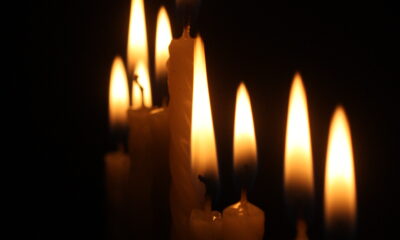
Parshot/Festivals

Oily clash of civilisations in one lamp
Most of us use candles for lighting the chanukiah, but our sages lauded the use of olive oil. The reasons for this are more revealing than you might have imagined. The oil used for salad dressing and good cooking turns out to be the focal point of the clash between ancient Greece and the Jewish people.
As you know, on Chanukah we celebrate the victory of our ancestors against foreign invaders. In 165 BCE, after three years of hostilities, the Jews, led by Judah Maccabee, finally drove out from Jerusalem the Greek-speaking occupying forces, led by the Selucid king, Antiochus Epiphanes.
But this wasn’t just a military victory of Israel’s Jews over the Greco-Syrians, it was also a cultural victory of Judaism over Hellenisation — the assimilation of Jews into ancient Greek culture.
Each year, we light the eight-branched chanukiah to remind us of the miraculous story of the small jar of unsullied olive oil that our ancestors discovered and used to rededicate the menorah in the ransacked Temple. A miracle occurred, and the menorah’s lights continued to burn for eight days until more pure oil could be produced.
In the Talmud, Rabbi Yehoshua ben Levi teaches that though any kind of oil is acceptable to use for the chanukiah lights, olive oil is most preferred (Shabbat 23a). Another scholar, Rabbah bar Nachmani, suggested that sesame oil might be better as its light is longer-lasting, but then he yields to Rabbi Yeshoshua because, he says, olive oil “produces a clearer light”.
Now that’s a surprise. Surely longer-lasting sesame oil would better remind us of the long-lasting little jug of oil? A second surprise is that no one cares to mention that it had always been olive oil that was used to light the actual menorah. As the Torah says, “Now you shall command the children of Israel that they bring you pure olive oil, pressed for illumination, to light the menorah continually.” (Exodus 27:20). Instead, what matters here seems to be the special clear light that’s unique to olive oil. What’s going on?
The continuation of the Talmud here is even more surprising. The discussion of Chanukah is interrupted so that Rabbi Yehoshua ben Levi can introduce another issue. He says that all oils are also fit for the production of the ink used to write our sacred scrolls, such as a Sefer Torah, but that, again, olive oil is most preferred.
As well as binding agents, this indelible black ink was produced by collecting the soot from the light of an olive oil lamp dissolved in yet more olive oil. So, although the ink for a modern Sefer Torah is now produced from alternative ingredients, the ideal Sefer Torah, as described by our Talmudic sages, clearly involved the copious use of olive oil to write every single letter. So it must be that this type of oil has some central importance to Jewish religious culture.
It turns out that olive oil was essential to Greek culture too. Athens, the ancient capital of Greece, took its name from Athena, the goddess of wisdom, because she introduced them to the olive tree.
The most common coin in ancient Greece depicted Athena on one side, wearing an olive wreath on her helmet, and an olive branch and owl (for wisdom) on the other. Even today, the Greek one euro coin has Athena and the olive branch on one side.
Olive oil is a staple of the Greek diet, and it has been an international supplier of this precious liquid for more than four millennia. Olive groves were considered sacred in ancient Greece, and Aristotle wrote that the olive tree was state-protected.
For more than a thousand years, the winners of the Olympic Games (which began in Olympia in 776 BCE) were crowned with a wreath made from an olive branch, and their reward was a lifetime’s supply of olive oil.
It’s no wonder then that olive oil-based lights became the symbol of Chanukah. That pure light represents the clash of civilisations between Greece and Israel. Essentially, the light symbolises wisdom. Its clarity meant you could read and study by it after dark, late into the night. And, just as gaining wisdom requires a huge investment of effort and time, so similarly, it takes 6kg of olives to produce just one litre of olive oil. So, olive oil represents the pursuit and attainment of wisdom for both cultures.
In fact, our sages had a deep respect for ancient Greek thought. Pythagoras, Socrates, Plato, Aristotle, and the Chochmei Atunah (the sages of Athens) are all given some recognition in rabbinic literature, and there are hundreds of Greek words in the Talmud. The rabbis sensed that the Greeks, like them, took life seriously and wanted to understand the nature of this world as well as humanity’s role in it.
But Greek thought had a dark side too because it over-emphasised physical beauty both in nature and in the human body. It understood the great virtues — glory, wisdom, love, etc —as manifestations of multiple gods rather than coming from one creator. Many Jews were seduced by this, and a large part of the Chanukah story was the intra-communal conflict between loyal and Hellenised Jews. That was a failure of our people which we must never allow to be repeated.
Today, we can still appreciate the best of Western philosophy, an approach which is rooted in ancient Greek wisdom. Crucially, though, Chanukah must remind us to be ever dedicated to our own particular faith, a faith that gave us G-dly wisdom to live by.
The rabbis of the Talmud valued both Chochmah (wisdom from great minds) and Torah (wisdom from G-d). The precious lights of your chanukiah symbolise enlightenment, both worldly and divine. Rather than clashing, these can be unified in order to live a most meaningful life and “see the light”. May you have an enlightening Chanukah.
- Rabbi Dr Raphael Zarum is dean of the London School of Jewish Studies.










